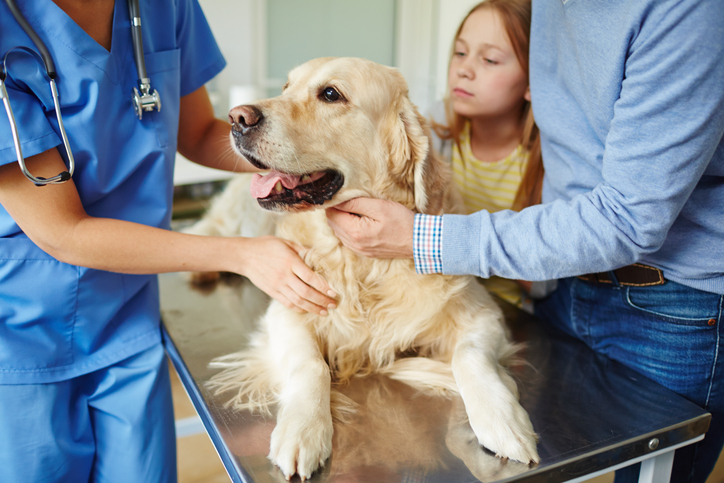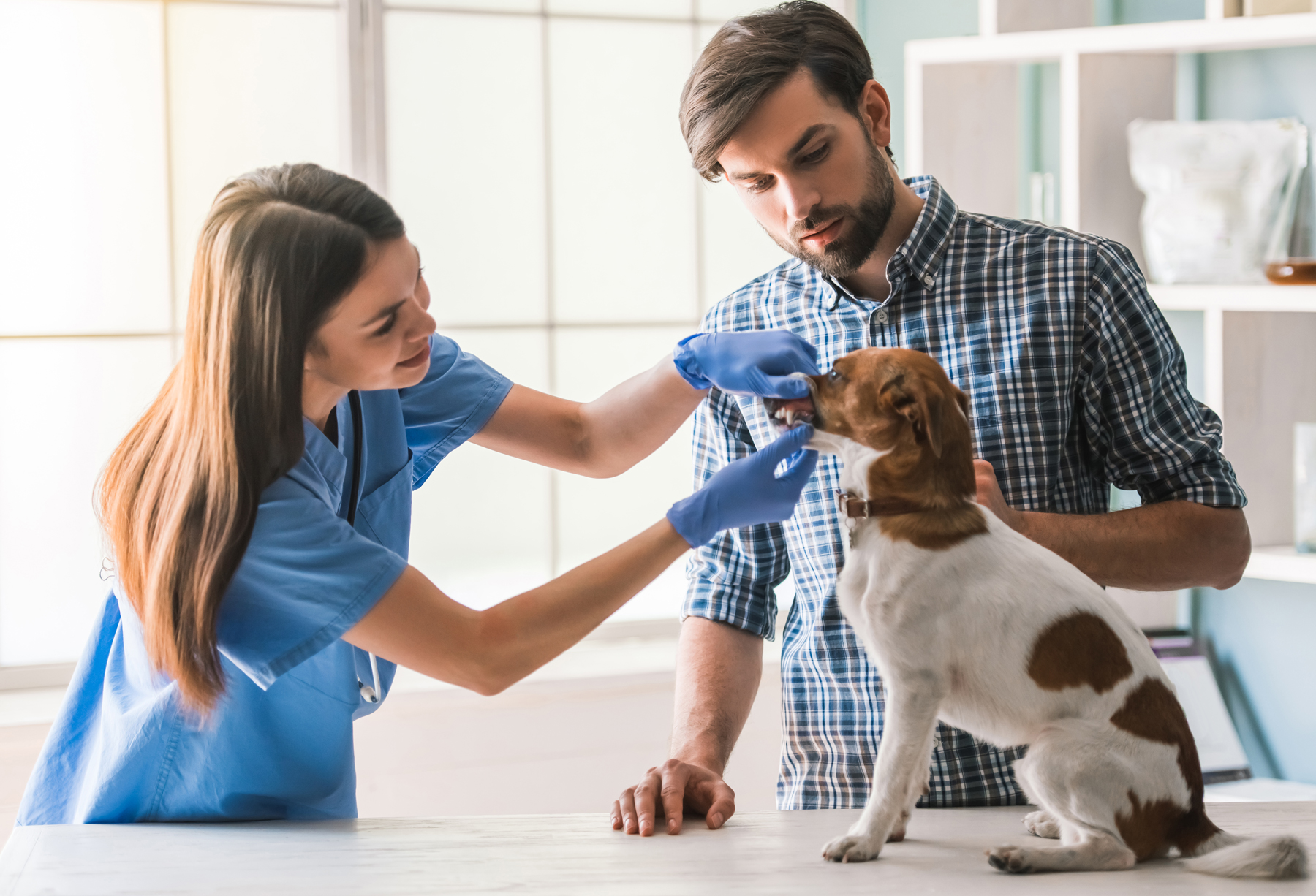What are phantom pregnancies in dogs?
18th March, 2020

Has your female dog started hoarding toys and growling if you come close? Or does she seem lethargic and out of sorts?
Phantom pregnancies are surprisingly common in unspayed dogs, fooling owners and their pets alike into thinking a litter of puppies is on its way. Depending on your perspective, that can be a delightful idea – or an alarming one!
Although false pregnancy symptoms should clear up on their own, they are easily confused with those of several serious conditions, meaning that a trip to the vet is a good idea for your pet pooch.
Read on for our guide to canine pseudo pregnancies, and how to make sure you’re covered for vets’ fees through insuring your dog.
What is a phantom pregnancy?
Phantom pregnancy, also called pseudocyesis or false or pseudo pregnancy, is a common condition in which unspayed female dogs start to mimic the physical and behavioural signs of pregnancy.
Although they may act and even look pregnant, there will be no pitter-patter of tiny paws in your household any time soon.
The condition usually becomes apparent four to nine weeks after the animal was in heat. It should clear up naturally within one to four weeks, leaving your pet unharmed and you either disappointed or mightily relieved!
Some vets believe that most female dogs will experience some phantom pregnancy symptoms after each time that they're in heat, though these are usually too mild to cause concern.
It’s believed that about half of all female dogs will have a phantom pregnancy in their lifetime unless they are spayed. In some breeds, such as Afghans, Beagles and Dachshunds, the likelihood is as high as 75%.
Once your dog has had one phantom pregnancy, she’s likely to experience others in the future unless you get her spayed before she’s next in season. Learn more about how to help a dog in season in our recent blog.

Symptoms of phantom pregnancy
Dogs who’ve developed a phantom pregnancy are likely to exhibit both physical and behavioural symptoms – much as they would if actually carrying a litter of puppies.
You may notice your pet acting in a motherly way. She might start nesting, for example by moving bedding around to try to create a den for herself and her phantom brood. She might also start digging in a bid to create a safe area for whelping her non-existent pups.
Your dog could also begin to show an interest in nursing, perhaps by becoming attached to one particular toy and acting in a protective manner around it.
This can make her more aggressive than usual, so take care if she’s around children or other dogs. This can also be the case for cats, so be aware of how to keep your children safe around cats.
There can be physical signs, such as a swollen belly. She may have enlarged mammary glands and start to produce discharge or even milk.
Some unlucky animals even experience contractions and go into false labour.
Other symptoms are harder to distinguish from those common to other conditions. They include lethargy, depression, restlessness, anxiety or clinginess. Loss of appetite or vomiting are also likely, though your dog may not actually lose any weight due to water retention.
Such symptoms are likely to make you concerned for the health and wellbeing of your precious pet, so a vet visit is in order to alleviate your worries and help keep your animal in the very best of health. Dog insurance helps you cover the costs.
Why do female dogs suffer phantom pregnancies?
False pregnancies are an unwelcome side effect of a female dog’s natural hormonal cycle.
A healthy pet is likely to experience her first heat cycle when she is between six months and one year old. Some smaller breeds experience this earlier, while larger breeds may not come into heat until they are around 18 months old.
Unless you spay your dog or she becomes pregnant, she’ll then be in heat for around 10 days once every six months.
After being in heat, her ovaries will begin to produce hormones which prepare her body for pregnancy – regardless of whether or not she has been mated.
If she is pregnant, her body will go on producing hormones to maintain her pregnancy, hopefully resulting in a lovely litter within the space of around nine weeks.
If she does happen to be pregnant, it may be nice to read our overall view of what to expect during pregnancy and the period after the litter is born. You can read these tips over on our 'How long is a dog pregnant' piece.
If she is not pregnant, these hormones may mimic actual pregnancy. They should subside within a few weeks, usually with no lasting effects.
It’s not known exactly why phantom pregnancies occur. An imbalance of the hormones progesterone and prolactin seems a likely cause, and it’s also thought to be linked to hypothyroidism or mastitis in some dogs.
Another theory is based on the fact that in the wild, dogs live in packs and all females help nurture litters of puppies born to the “alpha” pair.
It’s believed that false pregnancies prompt a dog’s mothering instincts to kick in, so that she will help care for all puppies in her pack, regardless of the fact that they’re not her own.

How can I find out if my dog is really pregnant?
If you have recently found a mate for your female dog, you might be pleased by the signs of pregnancy – then sorely disappointed when they turn out to be false.
If you have not recently introduced your animal to a mate, you might be alarmed to think that you’ll soon have an unexpected litter of puppies with an unknown sire on your hands!
You’ll probably be wondering how and where your pet met her mate, and how you’re going to find loving homes for all the puppies that appear to be on their way.
Whether you’re hoping your dog is pregnant or not, your vet can let you know what’s up by means of a blood or urine test. They might also carry out an ultrasound or x-ray to check there are no puppies on the way.
Reliable dog insurance covers vets’ fees, helping you look after your beloved pooch no matter what her condition.
If you are not planning to breed from your dog, regard a phantom pregnancy as a lucky escape – and a warning sign.
Book your animal in for spaying promptly – speak to your vet to find out more about the procedure. Make sure to check whether your pet insurance covers spaying prior to booking the appointment.
Should I take my dog to the vet?
Most phantom pregnancies clear up naturally within a few weeks. If symptoms are mild and you are absolutely sure she has not met any male dogs recently, you don’t need to do anything, though you might find a visit to your vet reassuring.
Sometimes, however, phantom pregnancies persist and distress a dog – and you, its owner. In that case, it’s best to get her checked over by a professional.
Once your vet is satisfied that your animal is not pregnant, they might want to check for any underlying conditions that could be causing the symptoms. These might include infections, an inactive thyroid gland, or a benign tumour of the pituitary gland.
A more serious illness that could be mistaken for a false pregnancy is pyometra, which is a life-threatening condition of the womb that’s usually caused by the E coli bacteria in the faeces. In this case, your animal will need an emergency operation to remove her womb.
Major health conditions such as pyometra are expensive to treat. Dog insurance will help you pay for vets’ fees.

How can my vet treat my dog’s phantom pregnancy?
When your vet is sure that a phantom rather than a genuine pregnancy is the cause of your dog’s symptoms, there are several treatments they might consider.
Medication to ease symptoms of anxiety is one possibility, as are diuretics to reduce milk production.
Some vets may also prescribe hormone therapy to treat your pet’s endocrine imbalance and clear up false pregnancy symptoms.
However, there are known side effects to such treatments, so they’re generally prescribed only if symptoms are prolonged or serious. In general, your vet is likely to adopt a watch-and-wait approach.
They should also give you detailed advice on how to care for your dog, alleviate her symptoms, and avoid future phantom pregnancies through spaying.
How can I treat my dog experiencing a phantom pregnancy?
Your vet will have helpful tips for caring for your dog throughout her false pregnancy.
One of the main symptoms that might concern you and aggravate your dog is milk production. If your dog starts to lick her mammary glands, this will further stimulate production.
Putting a special collar or just a t-shirt on your dog can prevent this. Take care not to rub the area yourself when stroking her.
Beyond that, just try to understand how your dog must be feeling. It’s a confusing, distressing time for her – so give her cuddles or allow her space, as she wishes.
Some dogs might appreciate extra walks to ease their restlessness and take their minds off their symptoms.
In some cases, your animal might steal items belonging to you, such as shoes and socks, and treat them as her “puppies”. It can be irritating to find she’s shredded your newspaper to make a nest, or to have to dig your trainers out from her den, but stay sympathetic rather than angry.
Store things out of her reach as much as possible, and be firm but kind towards her.
Essentially, though, there’s not much you can do except wait for the symptoms to clear, which should happen within a couple of weeks.

Are there any complications from phantom pregnancies?
In the short term, your dog should bounce back to normal quickly. However, there are some complications that you should be aware of.
The two most common are infection of the mammary glands, and inflammation of the skin around these glands. These can make your dog ill if left untreated, so you should visit your vet if you see any redness or swelling.
Note that once your dog has experienced one phantom pregnancy, she’s likely to develop the condition again after future heat cycles. Frequent pseudo pregnancies are linked to pyometra, womb infections, and breast cancers.
All of those conditions are life-threatening for your pooch and will lead to some expensive vet bills, so make sure you are covered by a dog insurance policy.
If your dog is prone to phantom pregnancies, you really should consider taking definitive action to prevent the condition recurring.
How to avoid a phantom pregnancy in a dog
There’s a very simple way to avoid phantom pregnancies: get your dog spayed. This quick and safe operation to remove your animal’s womb and ovaries can be carried out by your vet.
As well as preventing pregnancies and phantom pregnancies, spaying removes the risk of serious conditions such as pyometra and tumours or infections of the womb. It also reduces the chance of other illnesses such as breast cancer.
Your vet will advise you to wait until symptoms of false pregnancy are resolved before carrying out the spaying. Although the procedure involves a general anaesthetic, your dog should be able to come home the same day and is likely to be fully recovered within a couple of weeks.
If you want to breed from your dog, however, there’s nothing you can do to prevent phantom pregnancies.
Keep a close eye on her after she’s been in heat, and get veterinary attention straight away if she seems pregnant.
For optimum health, don’t breed from her before she turns one, and consider getting her spayed after she’s produced four litters of puppies.
The Kennel Club has further guidelines on safe dog breeding and in our recent blog we talk about our top tips on successfully breeding a dog.
Get a quote for dog insurance today
Whether she’s about to become a mum or not, your beloved pet pooch deserves the very best in health care.
Dog insurance specialists Purely Pets offer 15 levels of lifetime cover designed to suit your canine and your budget.
Cover for vets’ fees ranges from £1,000 to £15,000 depending on the policy you choose, and a 24-hour Vet Helpline is available to answer all your queries.
Complementary treatments and special diets are also covered.
You can choose an excess level from £60, and multi-pet insurance policies covering both dogs and cats are available for all the furry friends in your household.
Contact the team at Purely Pets today to get the right cover for your dog.
Helpful Pages
Recent Posts
Pet Insurance Quote
- 98% claims paid *
- Claims paid directly to vets
- 24/7 vet video consultations
- Interest free monthly payments




